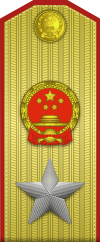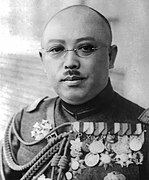Yuanshuai
| Yuanshuai Nguyên soái Nguyên soái | |
|---|---|
 Shoulder boards for the PLA rankyuan shuai(marshal), modelled after those of themarshal of the Soviet Union | |
| Country | |
| Service branch | |
| Abolished | 1965 |
| Next higher rank | Dayuanshuai( "Grand Marshal" ) |
| Next lower rank | Dajiang( "Grand General" ) |
Yuanshuai(simplified Chinese:Nguyên soái;traditional Chinese:Nguyên soái;pinyin:Yuánshuài) was a Chinese military rank that corresponds to amarshalin other nations.[1]It was given to distinguished generals during China's dynastic and republican periods. A higher level rank ofDayuanshuai(simplified Chinese:Đại nguyên soái;traditional Chinese:Đại nguyên soái;pinyin:Dà Yuánshuài;lit.'Grand Marshal'), which corresponds togeneralissimowas awarded toChiang Kai Shekof the Republic of China. It was also proposed forMao Zedongon the mainland, but he ultimately never accepted it.
Song dynasty[edit]
Jin dynasty[edit]
Republic of China[edit]
People's Republic of China[edit]
The rankMarshal of the People's Republic of China(traditional Chinese:Trung hoa nhân dân cộng hòa quốc nguyên soái;simplified Chinese:Trung hoa nhân dân cộng hòa quốc nguyên soái;pinyin:Zhōnghuá Rénmín Gònghéguó Yuánshuài) was awarded to ten veteran generals of thePeople's Liberation Army Ground Forcein 1955. However, it was abolished in 1965 and was never restored.[citation needed]Five important criteria must be met to attain the rank of Marshal:
- The candidate must have played a leading role in the establishment of one or moreRevolutionary base areas;
- Been a Corps Commander, equivalent or above in theChinese Red Army;
- Been a Divisional Commander, equivalent or above in theEighth Route Armyor a commander of theNew Fourth Army;
- A Field Army Commander, Area Army commander or equivalent in theChinese Communist Revolution;
- Been at least a National Defence Commission Deputy Commissioner prior to receiving the rank.
In addition, Chairman Mao, upon refusing the rank ofDayuanshuai,decreed that cadres who no longer serve in the PLA should lose eligibility for military ranks. Thus,Deng Xiaoping,Liu ShaoqiandZhou Enlaideclined the rank upon offer. Chen Yi also initially refused the rank in accordance to Mao's decree since he now primarily worked in government rather than the PLA. However, Zhou Enlai insisted he took it,[citation needed]citing that because all of the other nine Marshals came from theEighth Route Army,if he didn't take the rank, there would be nobody of the Marshal rank to represent the legacy of theNew Fourth Army,whilst simultaneously citingNikolai Bulganinwho held the rank ofMarshal of the Soviet Unionwhilst working primarily in government as precedence. Thus, he was given an exception and was awarded the rank.[citation needed]As a result, the recipients of the rank were:
-
1.Zhu De
-
3.Lin Biao
-
5.He Long
-
6.Chen Yi
-
10.Ye Jianying
Su Yuwas left out but he became the most senior of the tenDa Jiang.Many were surprised at this decision but he did not meet the first and second criterion. Seven of the ten Marshals took part in theNanchang Uprisingin various capacities withZhou Enlai.Of the other three, Peng Dehuai led the Pingjiang Uprising. Xu Xiangqian missed out on Nanchang but participated in the subsequent Guangzhou Uprising with Ye Jianying. The other wasLuo Ronghuan,who instead assisted Mao in theAutumn Harvest Uprising.Lin Biao was the youngest and Zhu De was the oldest of the ten Marshals aged 48 and 69 respectively at time of conferment. Luo Ronghuan was the first to die at age 61 in 1963 and Nie Rongzhen was the last to die aged 93 in 1992. Three of the ten Marshals were addressed by their honorific of lão tổng (Lao Zong, or "Old Chief" ) by Chairman Mao himself due to their seniority and long service. These wereZhu De,Peng DehuaiandHe Long.Chen Yiand Nie Rongzhen was sometimes also addressed as Lao Zong but not by Chairman Mao personally. One, Lin Biao, was simply addressed as tổng Zong due to his battle honours. He was not addressed as Lao Zong due to his youth and lesser seniority. He was also the only Marshal not to have died in Beijing.
See also[edit]
- Marshal of the Soviet Union
- Other pronunciations of theChinese charactersNguyên soái
- Gensui,the Japanese equivalent
- Wonsu,the Korean equivalent
- Nguyên soái,the Vietnamese equivalent
- Grand yuanshuai( đại nguyên soái ), a rank higher thanyuanshuai
- Dayuanshuaiin Chinese
- Dai-gensui,the Japanese equivalent
- Taewonsu,the Korean equivalent
- Đại nguyên soái,the Vietnamese equivalent
References[edit]
- ^Stevens, Keith G. (1975)."CHIEF MARSHAL T'IEN, PATRON OF THE STAGE, OF MUSICIANS AND WRESTLERS—EAST AND SOUTH EAST CHINA".Journal of the Hong Kong Branch of the Royal Asiatic Society.15:303–311.ISSN0085-5774.
External links[edit]
- PLA Figures atPLA Dailyat theWayback Machine(archived February 6, 2012)















